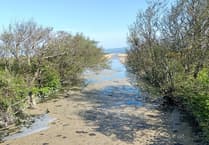NEW technology to prevent the over-fishing of octopuses and other sea creatures is being developed by scientists at Aberystwyth University.
The volume of fishing of octopuses, squid and other cephalopods - often known as inkfish because they can all squirt ink - has increased significantly over the past 60 years.
Octopus species are often misidentified, and their catch numbers and locations inaccurately reported.
This is prompting fears that a lack of data about these mollusks could lead to overfishing, threatening their future and an important source of protein-rich food for the world population.
A multidisciplinary research team, including academics in Aberystwyth, aims to address this knowledge gap by using environmental DNA, machine learning and artificial intelligence tools to create a seafood traceability network to improve stock management and ensure the sustainability of octopus fisheries.
One of the project’s senior scientists is Professor Paul Shaw, who is a Professor of Population Genetics & Genomics at the Institute of Biological, Environmental and Rural Sciences at Aberystwyth University.
He will be developing the global octopus genetic database on which the tracking of fishery products will depend.
Prof Shaw said: “Tracking and sharing information about where our seafood comes from is an essential part of efforts to prevent over-fishing.
“This cutting-edge technology will use machine learning, artificial intelligence and environmental DNA genetic methods to identify and track fishery products.
“The aim is to provide a proof-of-concept that can be rolled out to the fishing industry in general.
“So, while the team will focus on cephalopods, the longer-term aim is to provide a comprehensive system to enable any seafood item to be harvested, distributed and processed through to the consumer in an identifiable and sustainable way.”



.png?width=209&height=140&crop=209:145,smart&quality=75)

Comments
This article has no comments yet. Be the first to leave a comment.